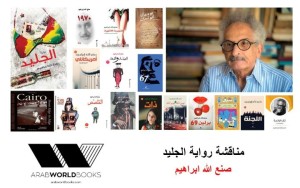Saifedean Ammous *
Imagine an American TV network deciding to take the American Idol format and apply it to poetry; lining up poets to read their poems in front of temperamental judges while the nation gets out its mobile phones to vote for its favorite poet. One can be sure the show would not survive the first commercial break before the chastened executives pull the plug on it and replace it with yet another series on the Life and Times of Nicole Ritchie. Yet, that was exactly the formula for the latest TV sensation to take Arab countries by storm.
Perhaps the only thing that is as hard as translating Arab poetry to other languages is trying to explain to non-Arabs the extent of poetry’s popularity, importance and Arabs’ strong attachment to it. Whereas poetry in America has been largely reduced to a ceremonial eccentricity that survives thanks to grants and subsidies from fanatics who care about it too much, in the Arab world it remains amongst the most popular forms of both literature and entertainment. Whereas America’s top poets may struggle to fill a small Barnes & Noble store for a reading, Palestine’s Mahmoud Darwish has filled football stadiums with thousands of fans eager to hear his unique recital of his powerful poems. And while in America a good poetry collection can expect to sell some 2,000 copies, in the Arab world the poems of pre-Islamic era poets are still widely read today in their original words, as are those from the different Islamic eras leading to the present. The late Syrian poet Nizar Qabbani had a cult following across the Arab world, and his romantic poems have for decades constituted standard covert currency between lovers.
The Arab World has had its own enormously successful pop music answer to American Idol in Superstar which has concluded its fourth season with resounding success, unearthing some real stars of today’s thriving Arabic cheesy pop scene. But a few months ago, the governors of the Emirate of Abu Dhabi took a bold move by organizing a similar contest for poets. This comes as another step in Abu Dhabi’s ambitious attempts to use its petro-dollars to transform itself into the capital of Arab culture, and one of the world’s leading cultural centers; a Florence to Dubai’s London.
The show, named Prince of Poets, was an enormous success. Some 4,000 poets from across the Arab world sent in submissions to be considered. 35 were chosen for the show, and millions of viewers from across the Arab world tuned in to watch them recite their poetry, get criticized by Arab poetry’s answer to Simon Cowell, Paula Abdul and Randy Jackson (5 older poets and professors), improvise verses on the spot, and address wide-ranging issues from women’s rights, Iraq, love, democratization, Palestine and the old staple of Arab poetry: self-aggrandization. The winner would not only gain fame, but also a grand prize of 1,000,000 UAE Dirhams ($270,000).
The success of the show was wilder than anyone could’ve expected. The Arab press has had reports about how it has achieved the highest ratings in its spot, overtaking football matches and reality-TV; and millions have paid for text messages to vote for their favorite poet.
The turning point in the show’s popularity, many have speculated, came when young Palestinian poet, Tamim Al-Barghouti, read his poem “In Jerusalem“. Tamim, who is a distant cousin and close friend of mine, is the son of famous Palestinian poet and writer Mourid Al-Barghouti (author of the excellent I Saw Ramallah) and Egyptian novelist Radwa Ashour. Tamim’s charisma, poetry, personality and politics captured the imagination of the Arab world. A veteran of years of student political activism in Palestine and Egypt, Tamim was once deported from Egypt by the authorities after engaging in one too many anti-Iraq War protests for the liking of Egypt’s regime. He then moved to America where he completed a Ph.D. in Political Science at Boston University in only three years, before working for the United Nations in Sudan. Through all of this, he has managed to publish four collections of poetry that have received critical acclaim and is expanding his Ph.D. thesis into a book on political identity in the Middle East to be published in 2008. He is now headed to Germany to become a fellow at the Berlin Institute for Advanced Study.
While many contestants opted away from talking about politics in their poems, hoping to not cause any grievance to the generous leaders of the United Arab Emirates who are hosting this show, or to any of the other Arab leaders, Tamim’s poetry was almost entirely political. Whether it was about Palestine, Iraq, or Arab dictatorships, Tamim was as courageous as he was eloquent, raising a few eyebrows in the quiet Emirate where discussing regional politics is not considered the wisest choice of discussion topic.
“In Jerusalem” is a poetic diary of Tamim’s last visit to his land’s occupied capital; a sad traverse through its occupied streets defiled by the occupation soldiers and the illegal settlers living on stolen Palestinian land, and around the apartheid walls choking the city with their racist denial of Palestinians’ basic freedoms and rights. Nonetheless, the poem ends on a cheery and optimistic tone, leading to the jubilant excitement with which the Arab world enjoyed the poem.
Palestinian newspapers have dubbed Tamim The Poet of Al-Aqsa; his posters hang on the streets of Jerusalem and other Palestinian cities, where key-chains are being sold with his picture on them. Sections of the poem have even become ring-tones blaring out from mobile phones across the Arab World, and 10-year-old kids compete in memorizing and reciting it. Hundreds of thousands of people have seen Tamim’s poems on Youtube and other video websites.
But perhaps Tamim’s most amazing feat was how he has galvanized all Palestinians into following him and supporting him. After all of the troubles that Palestine has been through recently, and all the divisions that have been spawned within the Palestinian people, it was very refreshing to finally find something that unequivocally unites all Palestinians, and rouses millions of Arabs behind the cause that was tarred recently by the actions of some Palestinians.
This unifying effect was most glaringly captured when the TV stations of both Hamas and Fatah threw their support behind the unsuspecting Tamim, broadcasting his poems repeatedly, and urging people to vote for him, catapulting him from a little known young poet into a symbol of national resistance and unity. Finally, after months of divisions amongst Palestinians, there was something uniting them: a reminder of the true essence of the cause of the Palestinians, of the real problem, the real enemies and the real need for unity to face these challenges for the sake of Palestinian people and their just cause.
All of which made the final result of the contest most surprising. After having consistently received the highest ranking from the viewers’ votes and the unanimous flattery of the judges, and after a barn-storming flawless last poem that had the judges gushing, Tamim ended up in fifth place out of the five finalists. The poetess that was expected to most strongly challenge Tamim, the Sudanese Rawda Al-Hajj, who had focused her poems on women’s empowerment, finished fourth. The winner, perhaps unsurprisingly, was Abdulkareem Maatouk, a poet from the host country, the United Arab Emirates, whose poems had steered clear of anything political or controversial.
Though Tamim refused to comment, speculation was rife that the results were rigged. That Tamim and Rawda, widely viewed as the two best poets, would finish bottom of the finalists was certainly implausible, and one could not help but imagine that politics came into play. Abu Dhabi may want to fashion itself as the capital of culture, but it probably values its political stability more than any cultural pretenses. Arab regimes may have behaved like warring tribes with narrow self-interest over the past century, but there is one thing in which their cooperation was always exemplary: the effective suppression of all voices of dissent. As the contest became more popular, and the crown of the Prince of Poets more prestigious, it may have become too hard for the organizers to accept giving the trophy to a Palestinian rabble-rouser who in one of his poems bemoaned the times that have “degraded the free amongst us, and made scoundrels into our rulers.”
Nonetheless, there is no doubt who the real winner was; it was not just Tamim and his poetry which will now rival Mahmoud Darwish’s as the voice of the Palestinians, but also the Palestinian people who were reminded of the meaning of their unity, and their cause, which has found its best advertisement that has strengthened the mutual affection, dedication and support of millions of Arabs in the midst of one of its darkest hours.
*Saifedean Ammous, who hails from Ramallah, Palestine, is pursuing a PhD in Sustainable Development at Columbia University, New York. He blogs at TheSaifHouse.wordpress.com.




